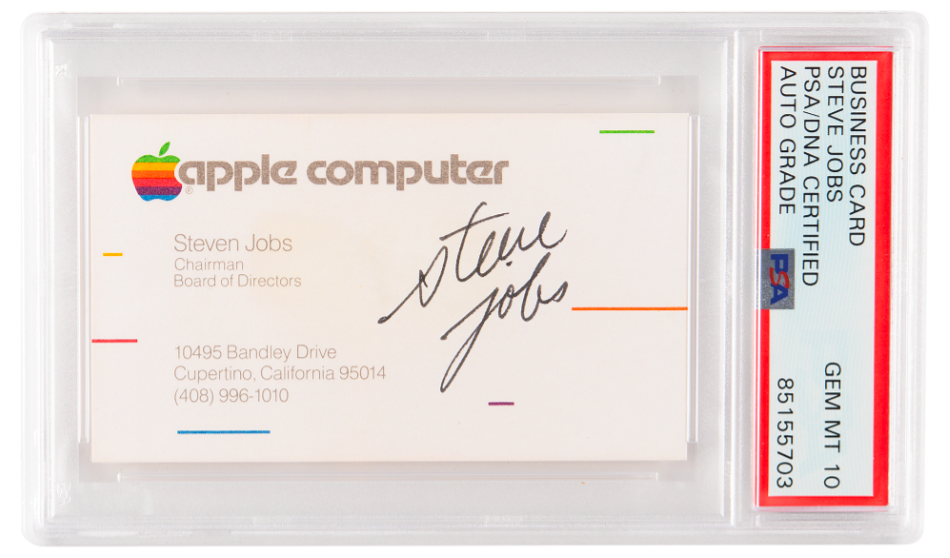
The U.S. government may have filed a sweeping antitrust case against Apple, but in the minds of its devotees the company’s reputation remains golden, unimpeachable even.
All the more so in the case of Apple’s co-founder, the late Steve Jobs. It’s a point that was reiterated at a recent sale by Boston-based RR Auction titled “Steve Jobs and the Apple Computer Revolution” on March 21.
There were six lots marked with Jobs’s signature. Two sold for six figures. The first, a 1983 business card with the rainbow version of Apple’s byte logo, sold for $181,183, shattering its modest $10,000 estimate.
The second, a Wells Fargo check from 1976 to Elmar Electronics predates Apple’s official founding and likely funded Apple-1 prototypes, went for $176,850, more than triple its estimate.
“The sale of the Steve Jobs-signed Apple business card for over $180,000 sets a new standard in autographed business cards,” said Bobby Livingston, an executive vice president at RR Auction. “It’s a testament to the enduring legacy of Jobs and the profound impact of Apple on our modern world.”
Other lots with Jobs’s John Hancock included a Pirates of the Caribbean: The Curse of the Black Pearl ticket stub ($14,653), a $200 check to Pacific Telephone that used his Palo Alto garage as his address ($66,069), and a job offer to Caroline Rose, who served the company for 15 years as a writer and editor ($17,706). Above her signature, the letter reads, “I accept this insanely great offer !!!”— “insanely great” being a celebrated Jobs-ism.
Apple-1 Computer Signed by Steve Wozniak. Photo: RR Auction.
Beyond Jobs, the auction was packed with lots that told the story of how Apple became America’s most valuable company. Chief among these was a fully functional Apple-1 board signed by co-founder Steve Wozniak. Tagged as computer number 100, the personal computer was one of the first that didn’t require the end user to solder. It sold for $323,789.
There were functional versions of Apple personal computers dating back to the early 1980s, but two lots that received considerable attention concerned inventions that never came to market. The first was a 1997 prototype of Apple’s eMate 300, a teal colored touchscreen laptop designed with the education market in mind. It sold for $8,529. The second was a prototype for the Apple Videopad 2 that is widely seen as a precursor to the iPad.
Apple eMate 300 Prototype, Apple’s Only Touchscreen Laptop. Photo: RR Auction.
As ever, sealed first generation iPhones were among the best-selling lots. A 4G model commanded $147,286. The cost of an equally unsullied 8G version? $25,000.
In recent years, early Apple products and Jobs related memorabilia have become its own auction category. Turtlenecks, leather jackets, and Birkenstocks previously worn by Jobs have all hit the auction block in recent years. A similar sale of Apple nostalgia from RR Auctions last year sold about 40 items that netted north of $500,000.